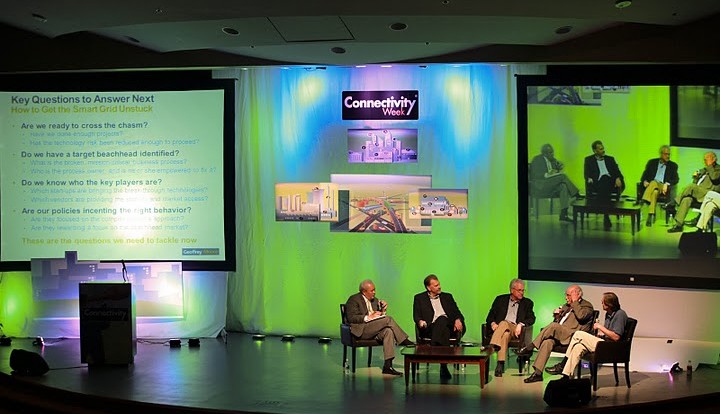Realizing The Benefits Of The Smart Grid
May 25, 2011
on
on

The Smart Grid is the center of attention at the annual ConnectivityWeek conference held in Silicon Valley this week. This year’s focus is on technological innovations and business models.
Although the import given to technological innovations are self-explanatory, the focus on business models is less so. Anto Budiardjo, President and CEO of Clasma Events and organizer of ConnectivityWeek, explains how alternative business models can help the Smart Grid rise to its potential.
Today’s electricity industry is a vertical market with only a few players on the field. If the industry would flip to a horizontal market in which everybody could participate, innovation would get an enormous boost. To make his point Budiardjo calls to mind the IT revolution of the eighties as an example for the development of the electricity industry today.
Data processing in the sixties and seventies was a vertical market catering only to specific business segments like banks and insurance companies. Only a few companies built computers for astronomical prices and only a hand full of specialists knew how to operate these machines. But when affordable personal computers became widely adopted by the general public in the eighties, the market went horizontal. Data processing capabilities became a product in high demand all over the spectrum and innovation abounded.
The electricity industry ought to flip from vertical to horizontal as well. Presently only a few businesses and specialists are active in the production process. The Smart Grid is about to change all that. “With more energy information available, Smart Grid applications will make it increasingly easy and beneficial for everyone to participate in some form of energy management. With Smart Grid capabilities at home, it will be possible for electronic devices to communicate with the grid and with one another to consume, generate, buy and sell power when it’s most cost-effective to do so -- activities once reserved for power companies, alone.”, writes Budiardjo.
The IT revolution enabled the democratization of information. Instead of being mere consumers of mass media outlets, we now have access to a neigh well infinite supply of information produced and made available for the people by the people. The Smart Grid could do the same for energy consumption and production.
Anto Budiardjo: Smart Grid -Let's Get Horizontal!
Although the import given to technological innovations are self-explanatory, the focus on business models is less so. Anto Budiardjo, President and CEO of Clasma Events and organizer of ConnectivityWeek, explains how alternative business models can help the Smart Grid rise to its potential.
Today’s electricity industry is a vertical market with only a few players on the field. If the industry would flip to a horizontal market in which everybody could participate, innovation would get an enormous boost. To make his point Budiardjo calls to mind the IT revolution of the eighties as an example for the development of the electricity industry today.
Data processing in the sixties and seventies was a vertical market catering only to specific business segments like banks and insurance companies. Only a few companies built computers for astronomical prices and only a hand full of specialists knew how to operate these machines. But when affordable personal computers became widely adopted by the general public in the eighties, the market went horizontal. Data processing capabilities became a product in high demand all over the spectrum and innovation abounded.
The electricity industry ought to flip from vertical to horizontal as well. Presently only a few businesses and specialists are active in the production process. The Smart Grid is about to change all that. “With more energy information available, Smart Grid applications will make it increasingly easy and beneficial for everyone to participate in some form of energy management. With Smart Grid capabilities at home, it will be possible for electronic devices to communicate with the grid and with one another to consume, generate, buy and sell power when it’s most cost-effective to do so -- activities once reserved for power companies, alone.”, writes Budiardjo.
The IT revolution enabled the democratization of information. Instead of being mere consumers of mass media outlets, we now have access to a neigh well infinite supply of information produced and made available for the people by the people. The Smart Grid could do the same for energy consumption and production.
Anto Budiardjo: Smart Grid -Let's Get Horizontal!
Read full article
Hide full article


Discussion (0 comments)